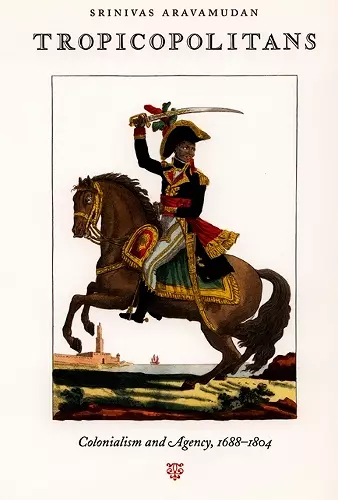Tropicopolitans
Colonialism and Agency, 1688–1804
Format:Paperback
Publisher:Duke University Press
Published:17th May '99
Currently unavailable, and unfortunately no date known when it will be back

This insightful exploration of colonial discourse in Tropicopolitans reveals the agency of oppressed peoples and the emergence of anticolonial consciousness in the eighteenth century.
In Tropicopolitans, Srinivas Aravamudan embarks on a thoughtful exploration of the colonial imagination during the eighteenth century. He delves into the representations of various peoples and cultures that were subjected to colonial discourse, emphasizing the agency of those oppressed. This work argues for the capacity of these individuals to resist domination, shedding light on the emergence of anticolonial consciousness that predates the nineteenth century. Through his analysis, Aravamudan reveals how literary texts played a crucial role in shaping perceptions and narratives during a time of significant imperial expansion.
The concept of 'tropicalization' serves as a central metaphor in this analysis, encapsulating the dynamic tropes through which the colonized were viewed, alongside the geographical focus of the study—primarily the tropics. Tropicopolitans refers to those who bear the weight of colonial representations while simultaneously resisting them. Aravamudan's readings of influential texts, such as Behn's Oroonoko, Defoe's Robinson Crusoe, and Swift's Gulliver's Travels, among others, reveal new relationships between literary representation and colonialism, offering fresh insights into the complexities of this era.
By introducing a postcolonial lens to eighteenth-century studies, Tropicopolitans presents a radical approach to literary history. This work is particularly relevant for scholars engaged in postcolonial studies, eighteenth-century literature, and literary theory, providing them with new mechanisms to understand the development of anticolonial agency and resistance within the literary canon of the time.
“Tropicopolitans might initiate a school of “tropicalization” studies. In the emerging field of what we have learned to name Black Atlantic writing, Aravamudan has made substantial contributions in his chapters on Equiano and Toussaint Louverture, in which each figure is richly, contextually read. The wrenching from a Euro-Christian framework into a tropicalizing one opens up these figures to new critical investigations instead of merely freezing their heroic status for all time. Aravamudan’s book should go some way toward helping us maintain our vigil against premature orthodoxies.”—Donna Landry, author of The Muses of Resistance: Laboring Class Women’s Poetry in Britain, 1739–1796
“Tropicopolitans is the most theoretically sophisticated study yet of colonialist texts in the eighteenth century.”—James Thompson, author of Models of Value: Eighteenth-Century Political Economy and the Novel
ISBN: 9780822323150
Dimensions: unknown
Weight: 612g
440 pages